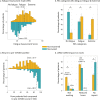Characterizing long COVID in an international cohort: 7 months of symptoms and their impact
- PMID: 34308300
- PMCID: PMC8280690
- DOI: 10.1016/j.eclinm.2021.101019
Characterizing long COVID in an international cohort: 7 months of symptoms and their impact
Abstract
Background: A significant number of patients with COVID-19 experience prolonged symptoms, known as Long COVID. Few systematic studies have investigated this population, particularly in outpatient settings. Hence, relatively little is known about symptom makeup and severity, expected clinical course, impact on daily functioning, and return to baseline health.
Methods: We conducted an online survey of people with suspected and confirmed COVID-19, distributed via COVID-19 support groups (e.g. Body Politic, Long COVID Support Group, Long Haul COVID Fighters) and social media (e.g. Twitter, Facebook). Data were collected from September 6, 2020 to November 25, 2020. We analyzed responses from 3762 participants with confirmed (diagnostic/antibody positive; 1020) or suspected (diagnostic/antibody negative or untested; 2742) COVID-19, from 56 countries, with illness lasting over 28 days and onset prior to June 2020. We estimated the prevalence of 203 symptoms in 10 organ systems and traced 66 symptoms over seven months. We measured the impact on life, work, and return to baseline health.
Findings: For the majority of respondents (>91%), the time to recovery exceeded 35 weeks. During their illness, participants experienced an average of 55.9+/- 25.5 (mean+/-STD) symptoms, across an average of 9.1 organ systems. The most frequent symptoms after month 6 were fatigue, post-exertional malaise, and cognitive dysfunction. Symptoms varied in their prevalence over time, and we identified three symptom clusters, each with a characteristic temporal profile. 85.9% of participants (95% CI, 84.8% to 87.0%) experienced relapses, primarily triggered by exercise, physical or mental activity, and stress. 86.7% (85.6% to 92.5%) of unrecovered respondents were experiencing fatigue at the time of survey, compared to 44.7% (38.5% to 50.5%) of recovered respondents. 1700 respondents (45.2%) required a reduced work schedule compared to pre-illness, and an additional 839 (22.3%) were not working at the time of survey due to illness. Cognitive dysfunction or memory issues were common across all age groups (~88%). Except for loss of smell and taste, the prevalence and trajectory of all symptoms were similar between groups with confirmed and suspected COVID-19.
Interpretation: Patients with Long COVID report prolonged, multisystem involvement and significant disability. By seven months, many patients have not yet recovered (mainly from systemic and neurological/cognitive symptoms), have not returned to previous levels of work, and continue to experience significant symptom burden.
Funding: All authors contributed to this work in a voluntary capacity. The cost of survey hosting (on Qualtrics) and publication fee was covered by AA's research grant (Wellcome Trust/Gatsby Charity via Sainsbury Wellcome center, UCL).
Keywords: COVID recovery; COVID-19; COVID-19 symptoms; Long COVID; Long Hauler; PASC; Patient-Led research; Post Acute COVID; Post-COVID-19 Syndrome; Post-acute Sequelae of COVID-19.
© 2021 The Authors.
Conflict of interest statement
All authors have completed the ICMJE uniform disclosure form and declare: no support from any organization for the submitted work. All authors except HED and GSA declare no financial relationships with any organization that might have an interest in the submitted work in the previous three years, no other relationships or activities that could appear to have influenced the submitted work. HED reports personal fees ($500 speaking fee) from Council for Medical Specialty Society, outside the submitted work. GSA reports personal fees ($1000 speaking fee) from Council for Medical Specialty Society and Karolinska Institute, outside the submitted work.
Figures












Similar articles
-
Impact of Long COVID on health and quality of life.HRB Open Res. 2022 Apr 22;5:31. doi: 10.12688/hrbopenres.13516.1. eCollection 2022. HRB Open Res. 2022. PMID: 36101871 Free PMC article.
-
Folic acid supplementation and malaria susceptibility and severity among people taking antifolate antimalarial drugs in endemic areas.Cochrane Database Syst Rev. 2022 Feb 1;2(2022):CD014217. doi: 10.1002/14651858.CD014217. Cochrane Database Syst Rev. 2022. PMID: 36321557 Free PMC article.
-
Characteristics and impact of Long Covid: Findings from an online survey.PLoS One. 2022 Mar 8;17(3):e0264331. doi: 10.1371/journal.pone.0264331. eCollection 2022. PLoS One. 2022. PMID: 35259179 Free PMC article.
-
American Medical Society for Sports Medicine position statement: concussion in sport.Br J Sports Med. 2013 Jan;47(1):15-26. doi: 10.1136/bjsports-2012-091941. Br J Sports Med. 2013. PMID: 23243113 Review.
-
Systematic reviews of the effectiveness of day care for people with severe mental disorders: (1) acute day hospital versus admission; (2) vocational rehabilitation; (3) day hospital versus outpatient care.Health Technol Assess. 2001;5(21):1-75. doi: 10.3310/hta5210. Health Technol Assess. 2001. PMID: 11532238 Review.
Cited by
-
Post-COVID-19 Syndrome: Retinal Microcirculation as a Potential Marker for Chronic Fatigue.Int J Mol Sci. 2022 Nov 8;23(22):13683. doi: 10.3390/ijms232213683. Int J Mol Sci. 2022. PMID: 36430175 Free PMC article.
-
Cognitive dysfunction associated with COVID-19: Prognostic role of circulating biomarkers and microRNAs.Front Aging Neurosci. 2022 Oct 4;14:1020092. doi: 10.3389/fnagi.2022.1020092. eCollection 2022. Front Aging Neurosci. 2022. PMID: 36268187 Free PMC article. Review.
-
Post-COVID-19 condition in the German working population: A cross-sectional study of 200,000 registered stem cell donors.J Intern Med. 2023 Mar;293(3):354-370. doi: 10.1111/joim.13587. Epub 2022 Dec 18. J Intern Med. 2023. PMID: 36373223 Free PMC article.
-
Community-Based View on Diagnostic Imaging at the End of COVID-19 Pandemic: Online Survey-Assisted Study.Diagnostics (Basel). 2024 Jun 15;14(12):1269. doi: 10.3390/diagnostics14121269. Diagnostics (Basel). 2024. PMID: 38928684 Free PMC article.
-
Impact of Long COVID on health and quality of life.HRB Open Res. 2022 Apr 22;5:31. doi: 10.12688/hrbopenres.13516.1. eCollection 2022. HRB Open Res. 2022. PMID: 36101871 Free PMC article.
References
-
- 2020. The prevalence of long COVID symptoms and COVID-19 complications [Internet]. Office for national statistics.https://www.ons.gov.uk/news/statementsandletters/theprevalenceoflongcovi... [cited 2020 Dec 17]. Available from:
-
- Petersen M.S., Kristiansen M.F., Hanusson K.D., Danielsen M.E., áSteig B., Gaini S. Long COVID in the Faroe Islands - a longitudinal study among non-hospitalized patients. Clinical Infect Dis [Internet] 2020 doi: 10.1093/cid/ciaa1792. Nov 30 [cited 2020 Dec 17];(ciaa1792). Available from: - DOI - PMC - PubMed
Grants and funding
LinkOut - more resources
Full Text Sources
Other Literature Sources
Research Materials

